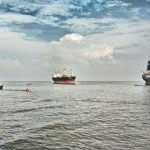The India-France Roadmap on Blue Economy and Ocean Governance, announced in Paris this February, has increased the salience of oceanic dimensions in New Delhi’s diplomatic strategy. The new domain of cooperation is likely to figure in Indo-French discussions during Prime Minister Narendra Modi’s visit to France this week. The time for blue diplomacy, which emphasises maritime security and sustainable harnessing of maritime resources, has arrived. Synergy among diplomats, naval experts, scientists, and industry is needed to realise the potential of India’s blue economy (BE).
The concept began seeping into the consciousness of academics and policymakers after the United Nations Conference on Sustainable Development – the Rio+20 summit – in 2012. There, the Small Island Developing States (SIDS) urged special consideration of their challenges to survive and develop through ocean-based economic activities depicted as BE. Soon thereafter, the Indian Ocean Rim Association for Regional Cooperation (IOR-ARC), later renamed the Indian Ocean Rim Association (IORA), began systematically pursuing the cause of BE. Sagarmala, the ambitious maritime development programme, continues to be central to the government’s maritime vision since 2015. It encompasses port modernisation, construction of new ports, connectivity enhancement, port-linked industrialisation, and sustainable development of coastal communities, envisioning an investment of about $13.23 billion.
India’s drive to promote BE has largely been conducted in multilateral forums. IORA tops the list, given India’s pre-eminent and strategic location in the Indian Ocean Region. The government, academics and business leadership have been actively supporting and shaping IORA’s programmes.
IORA demonstrated its commitment to BE through three ministerial conferences, the Jakarta Summit as well as a series of initiatives during 2014-2020. Besides, India held four workshops with the Association of Southeast Asian Nations (ASEAN) to develop policy convergence and joint BE projects.
The Indo-Pacific Oceans Initiative (IPOI), launched by Prime Minister Narendra Modi at the East Asia Summit in November 2019, addresses various aspects of BE even though the government did not mention it by name. India has been actively seeking partners to serve as “leads” for specific sectors. The pillars and their leads identified so far are: maritime security (India), maritime ecology (Australia), maritime resources (France and Indonesia), capacity building and resource sharing (lead country pending), disaster risk reduction and management (India), science, technology and academic cooperation (lead pending), and trade, connectivity and maritime transport (Japan). The government has urged specialised institutions to generate ideas and develop academic linkages.
Finally, BE also figures in bilateral discussions between India and Bangladesh, Sri Lanka and the Maldives. However, progress has been uneven, as the focus has been mostly on maritime security. There is one exception: The India-Norway dialogue has resulted in progress on the construction of zero-emission autonomous ferries and sustainable ship recycling. Now, progress on the implementation of the India-France roadmap will be watched with interest.
Blue diplomacy needs several measures. First, the draft policy framework should be elevated to an official policy with a clear focus on strategy and a practical roadmap. Second, the conduct of blue diplomacy should actively encompass business and industry, while remaining reliant on the scientific and academic community. India’s green foreign policy should acquire a blue tinge. The ministry of external affairs could do with a centralised BE unit. Finally, BE should be brought within the ambit of cooperation among Quad countries, which are equipped with vast oceanic resources. Enhanced cooperation in the BE realm will deepen their partnership further.
Considerable groundwork has already been done to turn India into a BE nation. Now is the time to accelerate the pace.
This article was first published in The Hindustan Times
Rajiv Bhatia is Distinguished Fellow, Foreign Policy Studies Programme, Gateway House, and a former ambassador.


